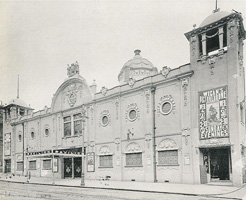
In Wigan’s ancient borough, when the century was new,
The Mayor each year would give a ball, for his supporters true.
The influential of the town, were graciously invited,
And those whose status was elite, were never never slighted.
But invitations also came to those of lower ranks,
Who, loyal to the Mayoral views earned complimentary thanks.
It was a grand occasion, requiring multi space,
So in Wigan’s huge pavilion this great event took place.
Windows were cleaned, the stairs were scrubbed, the seats were fumigated,
The dance floor polished to a shine, the carpets renovated.
Contracts were made for caterers, for florists and musicians,
Attendants, waters, waitresses, were booked for their positions.
The high class dress establishments gave fabulous displays,
And from their wealthy clientele gained profit and much praise.
The fabric shops had wisely stocked with satins, silks, brocades,
With velvets, laces, taffetas, in all the latest shades.
The dressmakers were busy, their needles plied all day,
And late into the night as well, creating dresses gay.
The tailoring shops had increased sales, as menfolk had ambition,
To wear a dress-suit as decreed, by gentlemen’s tradition.
The shoe shops offered evening shoes, for all the dancing feet,
The sales were high the owners pleased, that trading was replete.
Now all this fervour for the ball made interest up and down,
And as the date drew nearer was the topic of the town.
For everyone knew someone who had an invitation,
In the suburbs, in localities, in streets of every station.
So, when at last, the night, the hour, well wishers thronged the pathways,
The doors swung wide as cabs arrived and glamour filled the doorways.
The children too were curious, they gathered round the rails,
To glimpse a regal lady, and a gentleman in tails.
The success of each ball insured another one next year,
The Mayor had aspirations and a wonderful idea.
He, and the borough councillors would give a children’s ball,
The town would get a further boost with interest overall.
The children would be chosen from homes of good renown,
Regardless of their station but loyal to the crown.
All this caused great excitement, as children everywhere,
Eagerly awaited, a letter from the Mayor.
Long years have passed but still the thrill, the joy, the exhultation,
When through the post there came one day, the Mayoral invitation.
It stated that my presence was by the Mayor requested,
That I, though child of humble home, with this honour was invested.
The problem then was what to wear, my dress was far from new,
I’d had it for the walking day but it would have to do.
So washed and ironed the muslin white, was trimmed with silver bows,
A silver ribbon for my hair, my brooch a silver rose.
My slippers painted silver, for my hands were mittens white,
A dainty shawl for round my neck, to guard against the night.
Thus, was I ready for the ball, in my simple muslin dress,
Transformed with mother’s work and care, I felt like a princess.
The cab would cost a shilling, but six of us would share,
Three girls three boys to ride in style, and tuppence was the fare.
The other five were called for first, whilst I in suspense waited,
My local playmates round our door, becoming quite elated.
They cheered and shouted out my name, it was a great ovation,
They were so proud when I their friend, had got an invitation.
I heard the wheels the shouts increased, and great was the commotion,
But when I stood upon the step, quick silence and devotion.
Then, as I walked towards the cab, they all began to sing,
And I truly was a princess, for they sang, ‘God save the King.’

Written in 1986.
And…? Interestingly Doris decided not to put into verse her experience of the dance itself, as if the memorable story was of the preparation and anticipation.
 Edwardian Wiganners apparently loved to dance, as there were a number of town dances or balls held for various groups throughout the year. The Mayor’s Ball was perhaps the highlight of the dancing season, or so one would gather from Doris’s verse. Sometimes referred to as the Mayor’s Dance, was held annually in January. Initially it was held in the Drill Hall on Powell Street (since demolished). Beginning in 1910 it was moved to the (then) new pavilion in Library Street (pictured). Apparently this building was converted to a cinema in the 1920s and torn down in 1959.
Edwardian Wiganners apparently loved to dance, as there were a number of town dances or balls held for various groups throughout the year. The Mayor’s Ball was perhaps the highlight of the dancing season, or so one would gather from Doris’s verse. Sometimes referred to as the Mayor’s Dance, was held annually in January. Initially it was held in the Drill Hall on Powell Street (since demolished). Beginning in 1910 it was moved to the (then) new pavilion in Library Street (pictured). Apparently this building was converted to a cinema in the 1920s and torn down in 1959.
The Children’s Ball that Doris writes about was variously referred to as the Mayoral Juvenile Dance, The Mayor’s Juvenile Party, or the Juvenile Ball given by the Mayor and Mayoress. It was also held in January in the Drill Hall and later in the pavilion.
Doris attended the ball held by Mayor and Mrs. Ashton on January 11, 1912. The event is recorded in the Wigan Chronology which can be found on Wigan World:
Jan. 11
— Marriage of Mr. Charles Gerard Walmesley and Miss Mary Druitt at the Brompton Oratory, London.
— The Mayor and Mayoress (Alderman and Mrs. Ashton), give a juvenile dance in the Pavilion, Library Street.
Copyright Doris Darbyshire